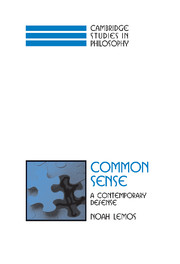Book contents
- Frontmatter
- Contents
- Acknowledgments
- Preface
- 1 The Common Sense Tradition
- 2 Common Sense and Reliability I
- 3 Common Sense and Reliability II
- 4 Reid, Reliability, and Reid's Wrong Turn
- 5 Moore, Skepticism, and the External World
- 6 Chisholm, Particularism, and Methodism
- 7 Common Sense and A Priori Epistemology
- 8 Particularism, Ethical Skepticism, and Moral Philosophy
- Conclusion
- Selected Bibliography
- Index
Preface
Published online by Cambridge University Press: 22 August 2009
- Frontmatter
- Contents
- Acknowledgments
- Preface
- 1 The Common Sense Tradition
- 2 Common Sense and Reliability I
- 3 Common Sense and Reliability II
- 4 Reid, Reliability, and Reid's Wrong Turn
- 5 Moore, Skepticism, and the External World
- 6 Chisholm, Particularism, and Methodism
- 7 Common Sense and A Priori Epistemology
- 8 Particularism, Ethical Skepticism, and Moral Philosophy
- Conclusion
- Selected Bibliography
- Index
Summary
Often showing only a polite interest in what I do, non-philosophers occasionally ask what I've been up to. I tell them that I've been working on a book on the common sense tradition in philosophy. Often I get a response like this: “Common sense?! What's that got to do with philosophy?” This response is (one hopes) a good-natured jab at philosophy and philosophers. Those who make it do know a little bit about philosophy. Many of them have read Hume or Berkeley or, at least, have some rough idea of their views. They know that some famous philosophers have said some pretty strange things that seem to contradict common sense. So they assume philosophy is just opposed to common sense. That seems to be, in my experience, a popular view of philosophy. Those who make these jabs are often unaware that there is another view of the matter. Thomas Reid, the Scottish contemporary and critic of Hume, wrote, “Philosophy … has no other root but the principles of Common Sense; it grows out of them, and draws its nourishment from them. Severed from this root, its honours wither, its sap is dried up, it dies and rots.”
Reid, who sought to reconcile philosophy with the principles of common sense, stands as one of the major figures in the common sense tradition. If the popular mind is largely ignorant of the common sense tradition, the same is not true of the philosophical community.
- Type
- Chapter
- Information
- Common SenseA Contemporary Defense, pp. xi - xviPublisher: Cambridge University PressPrint publication year: 2004



